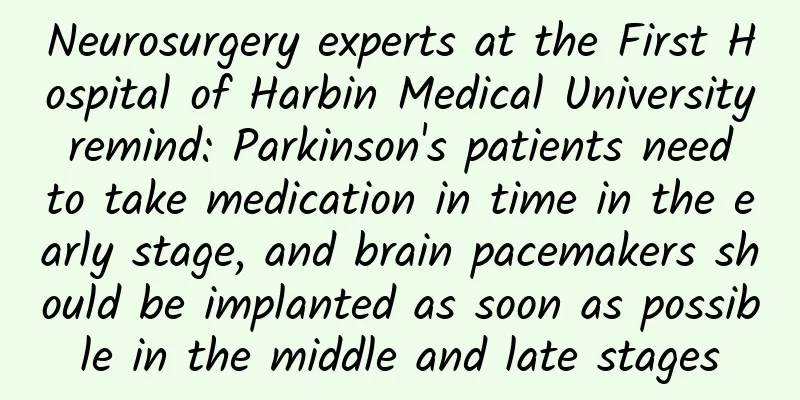Neurosurgery experts at the First Hospital of Harbin Medical University remind: Parkinson's patients need to take medication in time in the early stage, and brain pacemakers should be implanted as soon as possible in the middle and late stages

|
Uncle Liu, 63 years old this year, has suffered from Parkinson's disease for 13 years. He has been troubled by limb stiffness, hand tremors, and postural balance disorders for many years. He staggers when walking, as if he is drunk. The development of the disease is like a "runaway wild horse". Each medication can only last for one hour. He can only rely on a wheelchair to travel. From the pillar of the family before the disease, he has become an object that needs care at all times. Uncle Liu, who was in great pain, was recently admitted to the Fourth Ward of Neurosurgery of the First Affiliated Hospital of Harbin Medical University. After detailed discussions and comprehensive evaluations, the attending doctor, Associate Professor Zhu Minwei, and his team believed that he was suitable for ROSA robot-assisted brain pacing surgery. As a result, the brain pacemaker was turned on and debugged less than a month after the operation. The old man's tremor symptoms completely disappeared, he turned around freely and walked briskly, completely got rid of the constraints of the wheelchair, and resumed his self-care state. One of the three major killers of the elderly On the eve of World Parkinson's Day on April 11, Professor Zhu Minwei introduced to the media that Parkinson's disease is a common neurodegenerative disease that mainly occurs in middle-aged and elderly people over 50 years old. Therefore, it is listed as one of the "three major killers of the elderly" along with tumors and cardiovascular and cerebrovascular diseases. The clinical manifestations of this disease are tremors in the hands and feet, stiff limbs, slow movements, etc.; in the middle and late stages, it will affect swallowing and speaking, leading to difficulties in turning over, insomnia, muscle stiffness, cramps, joint deformation and other problems, and eventually bedridden. Famous writers at home and abroad, such as Ba Jin, mathematician Chen Jingrun, and boxing champion Ali, have all suffered from Parkinson's disease and died as a result. Statistics show that among people over 65 years old, 17 out of every 1,000 people may suffer from Parkinson's disease. Based on this, it is estimated that by 2030, the number of Parkinson's patients in my country will rise to 5 million. Among the more than 37 million people in Heilongjiang Province, there are about 4 million middle-aged and elderly people over 65 years old. Based on the 1.7% prevalence rate among people over 65 years old, there are approximately 73,400 Parkinson's patients in the province. As early as more than 200 years ago, the medical community had a deep understanding and insight into Parkinson's disease. In 1817, Dr. James Parkinson, a British physician, gave a detailed description of patients with this disease: resting tremor, bradykinesia, muscle rigidity, posture and gait disorders, some accompanied by non-motor symptoms such as depression, cognitive and mental disorders, sleep disorders, olfactory disorders, and autonomic dysfunction. Studies have shown that the most important pathological change of Parkinson's disease is the degeneration and death of dopaminergic neurons in the substantia nigra in the human brain, which causes a significant decrease in dopamine content in the striatum and causes the disease. However, the mystery of Parkinson's disease has not been solved so far. It is speculated that it is closely related to factors such as genetics, environment, aging and oxidative stress. In order to commemorate Dr. Parkinson, people set his birthday on April 11 every year as "World Parkinson's Day." The mystery of the cause has not yet been successfully solved Professor Zhu Minwei pointed out that the mystery of the cause of Parkinson's disease has not yet been revealed. It is speculated that it is related to multiple factors such as genetics, environment, and aging, which cause the death of substantia nigra neurons in the brain. These neurons in the substantia nigra in the brain can secrete an important chemical substance - dopamine. This special substance plays an important role in regulating muscle activity and maintaining body posture balance. If the body is severely deficient in dopamine, the human body will experience limb tremors, stiffness, stiffness of the whole body, slow movements, and poor rotation, making people "unable to sit, get up, or walk." In the early stages of the disease, people mostly use compound levodopa, dopamine receptor agonists, anticholinergics and other drugs to curb the disease, and the effect is relatively ideal, generally lasting about 5-8 years. This period of time is described as the "honeymoon period." As the course of the disease progresses and deepens, the efficacy of the drug gradually decreases, and even has no effect. In the later stages, some patients even "dance with joy" and are completely out of control, which is medically called "dyskinesia." Not only that, in addition to the above-mentioned movement problems, the often accompanying non-motor symptoms will also bring more troubles to Parkinson's patients, such as constipation, urgency, sleep disorders, pain, sweating, anxiety, depression and hallucinations. Brain pacemakers curb the spread of disease At present, when medication has basically failed, surgical nerve nucleus destruction and deep brain electrical stimulation (commonly known as brain pacemaker surgery) can be considered. The former destroys the activity of neurons in the brain nuclei, and the latter uses electrical stimulation to regulate abnormal neural electrical activity, thereby alleviating and controlling the symptoms of Parkinson's disease. The former is gradually neglected or abandoned due to its destructiveness, irreversibility, and recurrence, while the latter is gradually emerging due to its non-destructiveness, reversibility, and sustainability, as well as the significant reduction in the cost of using domestic equipment. Zhu Minwei explained that as the most advanced minimally invasive neuroregulatory technology in the world, brain pacemaker surgery is to accurately implant two electrodes in the patient's brain, connect the pulse transmitter buried under the chest skin with an extension wire, and use the electrodes implanted in the brain's nerve nuclei to emit electrical pulses, completely subduing the "crazy and unrestrained" Parkinson's disease, and ultimately improving the patient's limb motor function, and can achieve long-term satisfactory therapeutic effects by adjusting the stimulation parameters. So, what kind of Parkinson's patients are suitable for brain pacemaker surgery? Professor Zhu introduced that according to the diagnosis and treatment standards and guidelines at home and abroad, whether to accept brain pacemaker surgery needs to meet the following points: primary Parkinson's disease, hereditary Parkinson's disease, genotype Parkinson's disease; once or currently effective for levodopa drugs, but the duration of the current drug is significantly shortened, showing a "switch" phenomenon of getting better and worse, or due to "dyskinesia" after taking the drug; the course of the disease is more than 5 years, and the improvement of the stubborn tremor after standardized medication is still not ideal, and it seriously interferes with the patient's quality of life. Surgery can also be considered for patients with a course of more than 3 years; when choosing surgery, the patient's age should not exceed 75 years old. If the physical condition permits, and there is no risk of cardiovascular and cerebrovascular diseases after evaluation, it can be relaxed to about 80 years old. In 2017, Professor Zhu Minwei went to the Neurological Center of the Medical School of the University of Freiburg in Germany as a visiting scholar for further study. After returning to China, he was the first in Heilongjiang Province to apply brain pacing technology to surgery, and accumulated a lot of practical experience. His clinical concept and experience is that although brain pacemakers are effective, not all cases are suitable for placement. For example, some patients have obvious cognitive dysfunction, and cognitive dysfunction poses great difficulties in social interaction and work; accompanied by severe depression, anxiety, hallucinations and other mental illnesses; the presence of other coexisting diseases, such as tumors, renal failure, and severe cardiovascular and cerebrovascular diseases, are not conducive to surgery or survival, etc. The timing of implanting a brain pacemaker should also be just right, not too early or too late, because the early symptoms are relatively mild and respond well to drugs. At the same time, the diagnosis and treatment of primary Parkinson's patients requires long-term follow-up. A clear diagnosis can ensure the effectiveness of the surgery, and "stepping on the brakes" too early may not be ideal. Similarly, with the increase of age and the evolution of the disease, the patient's cardiopulmonary function and general condition are getting worse and worse, and dementia and mental symptoms are prone to occur in the later stage, which invisibly increases the risk of surgery and may miss the best time for surgery. So far, Zhu Minwei's team has completed a total of 152 electrode implants, with patients ranging in age from 28 to 78 years old, involving Parkinson's disease, dystonia, etc. The overall surgical efficiency is above 90%, and the symptoms of the vast majority of patients have been greatly improved. They can brush their teeth, wash their faces and perform various activities by themselves, and have completely achieved self-care. Finally, Professor Zhu Minwei solemnly reminded the public that Parkinson's disease is a seemingly simple but actually quite complex disease that requires a long period of struggle and battle. An indisputable fact is that the disease cannot be completely cured at this stage. Some false advertisements in the market claiming to cure Parkinson's disease are absolutely unreliable. Patients should believe in science and professional doctors, take medication on time under the guidance of experts, or receive deep brain stimulation as early as possible in the middle and late stages of the disease. Zhu Minwei called on the whole society to care, pay attention to, and love Parkinson's patients, hoping that they can get rid of the torture of "Parkinson's demon" as soon as possible and return to a healthy life. |
Recommend
Can I still keep the baby if I have low progesterone and bleeding?
We all know that we are happy and anxious during ...
Why do women want to sleep when they feel tired and weak?
People often feel tired and weak, especially thos...
What do you need to prepare when entering the delivery room? What clothes should you wear when entering the delivery room?
We all know that there are many things to pay att...
What seasonings are needed for braised prawns? Do I need to remove the prawn heads when braising prawns?
Braised prawns in oil is a specialty dish in Shan...
What are the food therapies for breast hyperplasia?
Breast hyperplasia is a disease that troubles man...
Does your child always complain of leg pain at night? Don’t panic! It may be “growing pains” that are helping him grow taller
On the road to growth, every teenager is a brave ...
What are the rules for burning paper on July 15th? What should we pay attention to when burning incense on July 15th?
The 15th day of the seventh lunar month is also k...
Is essential oil massage effective for breasts?
Many girls choose to use essential oils to enlarg...
Why do I need to be on an empty stomach for blood draw? Does drinking water count as being on an empty stomach? I finally figured it out today.
For hospitalization, blood draws are usually done...
7 AIDS patients were cured. What exactly is functional cure?
Tuchong Creative AIDS is the full name of acquire...
Microscopic health has eight dimensions! Cell article defines health
What is health? A healthy person is considered to...
What is the Perfect Relationship based on and what is the ending of the Perfect Relationship?
As the holiday is extended, more and more TV dram...
How to prevent threatened miscarriage in four months of pregnancy
A baby is the hope of every family, but sometimes...
What are the physical symptoms after ovulation?
Ovulation is an important characteristic of the f...









